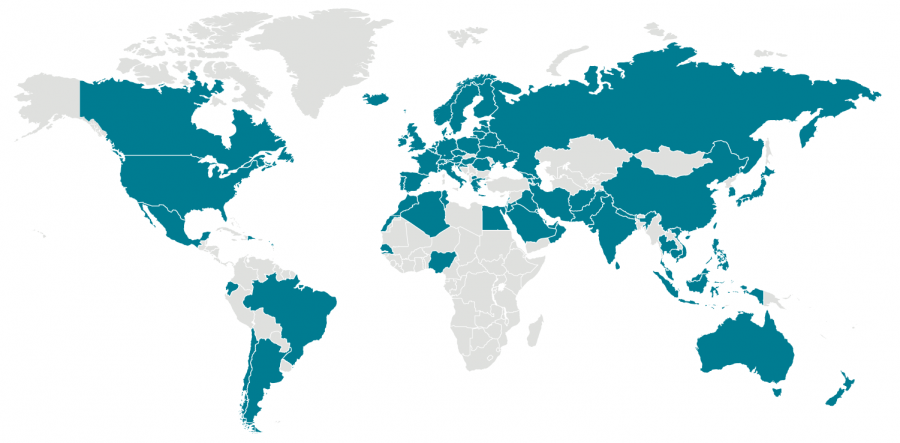Opinion: Greater measures needed to contain, treat coronavirus
GLOBAL: This global map depicts all COVID-19 confirmed cases around the world.
March 6, 2020
Globally, governments should invest more funding in the development of vaccines for the coronavirus (COVID-19), along with continuing quarantines to prevent a massive outbreak.
This threat is serious as the virus has caused problems ranging from race issues to health concerns.
As of Mar. 6, 2020, the disease has already shown intimidating warnings. “The novel coronavirus has now killed more than 3,300 people, the vast majority in mainland China, [with] more than 100,000 confirmed cases of the novel coronavirus,” wrote Ben Westcott, Adam Renton, Jack Guy, and Ivana Kottasova of CNN.
According to the Center for Disease Control and Prevention (CDC), the virus poses a threat due to its ability to spread easily through person-to-person contact and contact with infected surfaces.
In addition, there is currently no cure or vaccine to treat and prevent the disease. A vaccine could take 12-18 months, according to the World Health Organization director-general, Tedros Adhanom Ghebreyesus.
The epidemic is a great menace internationally. Michael Hughes, a history teacher, believes the virus will continue developing. He said, “It will probably spread more and will continue spreading, and we will know soon whether or not it reverses course but the only way to do that is using these quarantine measures.”
Hughes already considers this a global threat. “Someone got it in Malaysia. Someone got it in Japan. Someone in Chicago has it. And I think someone in Africa has it,” he said.
However, containment spreads moral concerns. In reference to the incident on the Diamond Princess cruise ship, Hughes said, “People aren’t willingly giving up their civil rights. There’s a lot of controversy on whether the people on that cruise ship should have to go through the two-week mandatory testing.”
Although, Hughes understands the reasoning. “I think if you ask the average American, you’re going to have to sacrifice the freedoms of these people to move around for a few weeks while we see if they’re symptomatic,” he said.
Chinese-American sophomore Ethan Fong agreed. He said, “There are also not enough resources in Wuhan and more people are dying than it would normally if it weren’t such a dense city. The quarantines are necessary but very devastating for the people.”
The coronavirus has not only infected and killed people. In addition, many people of Asian descent across the world have faced discrimination, racism, and xenophobic attitudes as the number of confirmed cases continue to increase.
This prejudice is unacceptable, along with the stereotypes and misinformation associated with the Asian community and the disease.
Fong is aware of discrimination because of the disease. He said, “ To me, personally, nothing beyond harmless jokes have come my way. However, I am aware of other Asians who have faced discrimination, such as Asian food being boycotted in fear of it containing the virus, and people getting harmed on public transportation because they are thought to have it.”
An NBC news article by Ali Gostanian, Suzanne Ciechalski, and Rima Abdelkader states multiple instances where even non-Chinese Asians are targeted and harassed in xenophobic incidents. These encounters include profanities and outbursts in public as well as signs barring Chinese people with the reasoning being the virus.
At a Super 8 Motel in Plymouth, In., two Hmong men were given a hard time and discriminated against by an employee because of their ethnicity and the coronavirus according to Shawn Nottingham and Dave Alsup of CNN.
Hughes strongly disagrees with the discrimination of people based on their race. He said, “The ignorance is annoying and people of Asian descent in America probably get a lot of that in their lives, even when it’s not the coronavirus. It’s probably a really annoying thing, the stereotypes people make about Asians. Many people assume that because China is the biggest one that all Asians are from China [even though] not every Asian country is the same.”
On the other hand, he does understand other reasons for the discrimination of people. He said, “[If anything,] I would be more discriminatory toward [people] who traveled to China if I found out [they were] in Wuhan. I don’t care if [they’re] Asian or European, I’m discriminating against [them] because [they were] there. Now [there] is the assumption Americans are making [that] every single Asian person is Chinese [and] must have been in Wuhan.”
Accurate information is another problem due to China’s communist government. “China is a repressive government and they’ve spent a long time doing what the Soviet Union did in the ’80s when they had their Chernobyl nuclear disaster, [covering] it up for a few weeks. We don’t really know the extent of what’s going on in China [because] they are possibly withholding information, whereas the US public is demanding as much information as possible. [They have] to be more open to admitting that [they’ve] got a lot of people with coronavirus and sometimes it doesn’t look good to admit it but it’s what needs to happen in order to contain it,” Hughes said.
Fong agreed that China isn’t dealing with the situation in the best manner. He said, “I believe that China isn’t doing the best job with handling the virus in terms of informing the public. They tried to keep it a secret for as long as they could and then totally shut down transportation too late. ”
The impact of the virus has taken its toll on many lives around the world, killing hundreds and affecting millions globally. Without proper quarantines, research in the treatments and vaccines, and the openness of the Chinese government, the Coronavirus will continue to linger and spread, possibly becoming a greater ordeal in the future.






















































